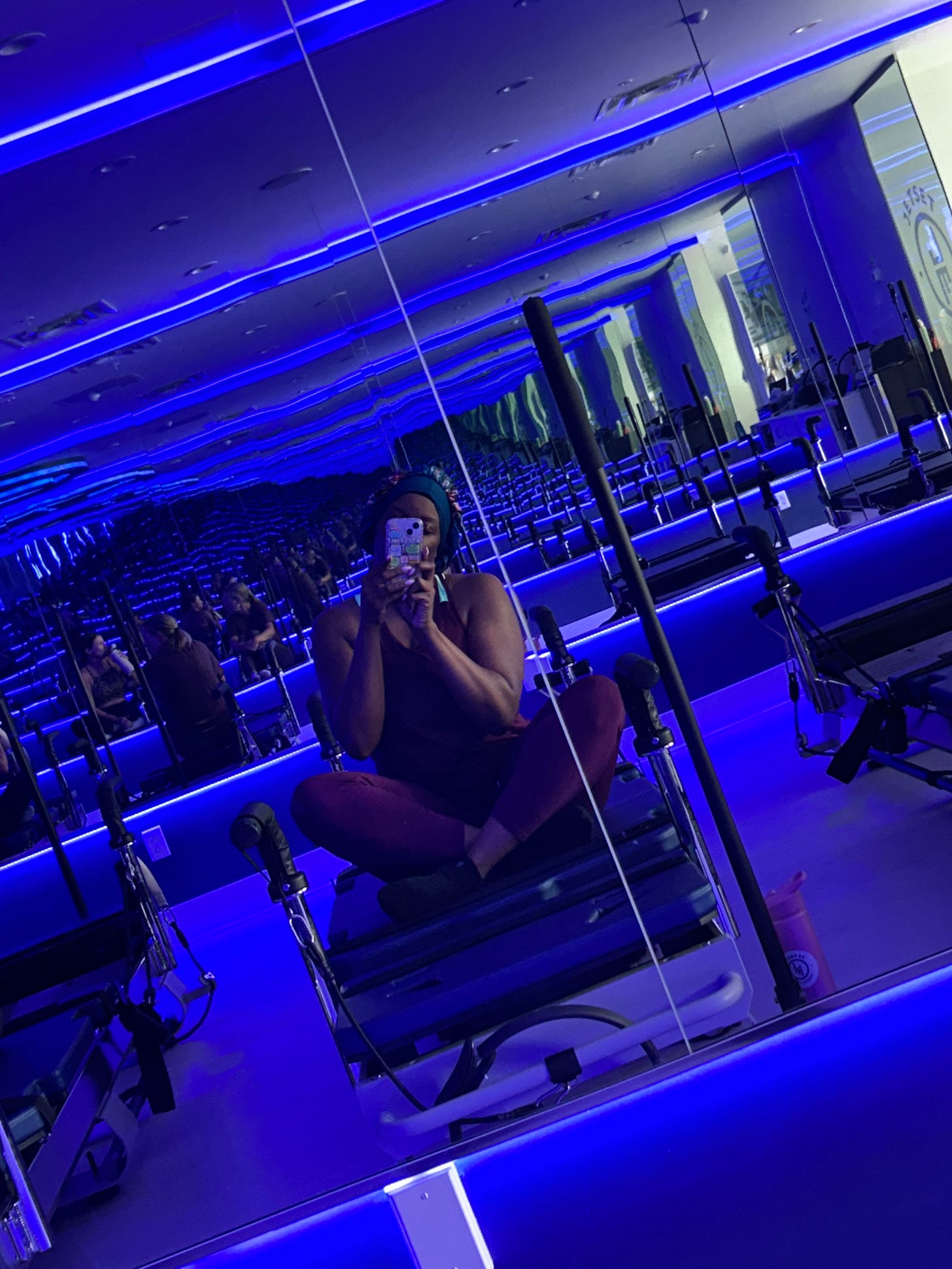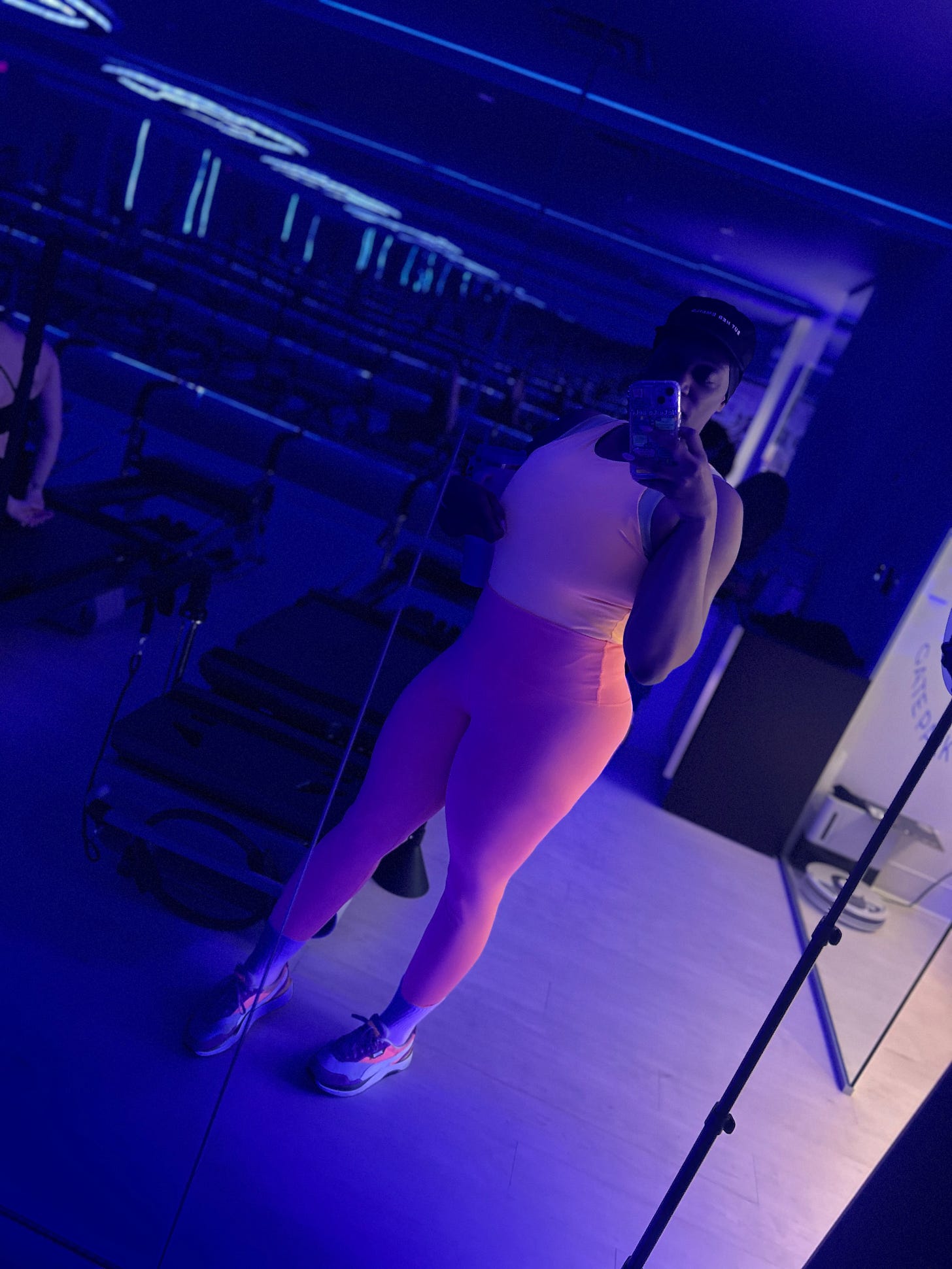When Do Black Women Get a Movement Practice That Respects Our Brains?
They gave us SnapBack culture instead of brain science and we believed them.
The way we talk about Pilates in wellness spaces has always been thin. And I do not just mean physically. I mean conceptually, intellectually, and neurologically. Pilates is sold to Black women as a way to "tighten our core," "lift our booties," or "snap back" after childbirth. But what if I told you that Pilates might actually be one of the most potent, underused forms of brain medicine for us—especially during pregnancy, postpartum, perimenopause, and even fertility treatment? This is particularly crucial for us, as Black women, who face unique challenges in health and wellness spaces due to chronic stress, systemic racism, medical violence, and hormonal shifts that disproportionately affect our neurology.
It's not an exaggeration. We're talking about significant changes in gray matter volume, enhancements in executive function, and interventions in trauma-related shrinkage of the hippocampus. This is Pilates as a cognitive tool, not a beauty standard. The medical field continues to overlook the unique ways Black women's brains are under assault—by chronic stress, systemic racism, medical violence, and hormonal shifts that disproportionately affect our neurology. Since no one is going to prioritize our cognition but us, it's crucial that we initiate this conversation now.
Let me REMIND you…
The Pregnant Brain Shrinks—And They Don't Talk About That Either
Research has confirmed that pregnancy changes the structure of the brain, particularly in the prefrontal cortex and hippocampus—regions responsible for memory, emotional regulation, and decision-making. One study found that pregnant women lost gray matter in specific brain regions and that these reductions were still present two years postpartum. This isn't "baby brain" as a myth. This is a structural brain change as a medical fact.
For instance, Buss et al. (2010) showed that elevated maternal cortisol levels during pregnancy correlate with reduced gray matter volumes in offspring, particularly in memory-related brain regions like the hippocampus. This means that the stress experienced by Black women during pregnancy can have a direct impact on the brain development of their children. Glynn et al. (2018) expanded on this by demonstrating how maternal trauma and stress—not just cortisol, but chronic emotional dysregulation—alter both fetal brain development and the mother's neural pathways.
Now here's where we, as Black women, need to zoom in. Because what the research doesn't say, but what we know, is that our cortisol levels are already high before pregnancy. Add institutional neglect, obstetric racism, and generational trauma to that equation, and the cognitive load becomes unbearable. No one is studying how our brains respond when we're forced to be both caregiver and survivor in a system that treats us like neither. This is an urgent issue that needs immediate attention and action. Pilates Isn't Soft. It's a Neurological Intervention
We need to stop calling Pilates "low impact" like it's somehow low value. The truth is, Pilates directly activates brain systems that regulate memory, attention, coordination, and emotion. It is a structured, intentional, closed-chain movement system that demands constant proprioceptive feedback. This isn't stretching. This is neuroplasticity in motion.
Gothe et al. (2016) found that mind–body exercise modalities like Pilates improve executive functioning and memory recall and reduce depressive symptoms in midlife women. They observed increased performance in working memory tasks after regular practice. Basso & Suzuki (2017) explored how movement impacts the brain on both a structural and chemical level, citing improved performance in executive tasks, greater neurogenesis, and enhanced BDNF (brain-derived neurotrophic factor) levels in adults who engage in coordinated physical movement.
If Black women are carrying the burden of constant hypervigilance, then what we need is not another boot camp or HIIT circuit. We need modalities that train the prefrontal cortex to recover from that hyperarousal. We need to regulate, not grind. Pilates trains interoception, body-led safety, and breath-to-movement synchronization, all of which directly communicate with the parasympathetic nervous system to restore a sense of internal calm. And if we know trauma compromises the brain's ability to regulate, then Pilates becomes not just helpful but urgent.
Black Women and the Science of Stress: We Need More Than Casual Movement
The idea that walking or dancing is enough for us to "stay healthy" completely ignores the very real neurobiological toll that racism has on the brain. Geronimus et al. (2006) introduced the concept of "weathering," explaining how Black women experience faster biological aging due to repeated exposure to stress. Their study connected this to higher allostatic load scores, cardiovascular decline, and cognitive deterioration that begins earlier than in white counterparts.
And let's not forget the deeper trauma narrative. Bryant-Davis et al. (2005) emphasized that trauma in Black women is often misdiagnosed, under-treated, or mistaken for strength. Black women are routinely excluded from culturally competent care. That exclusion extends to our movement spaces, which are often white-centered, fatphobic, and fixated on aesthetics over trauma-informed practice.
Pilates offers a somatic strategy for recovery that doesn't rely on verbal processing. It allows for self-guided, private neurological repair. It doesn't ask you to cause pain. It asks you to notice it, move with it, breathe through it, and re-pattern it. This is a form of care that empowers us to take control of our health in a way that we may have never been offered—let alone prescribed.
Functional Brain Changes in Pilates: The Imaging Doesn't Lie
This is where we bring in the functional imaging. Researchers using fMRI technology have observed increased activation in the dorsolateral prefrontal cortex, cerebellum, and default mode network during and after Pilates and similar mind–body movement. These are not just muscular changes. These are neurological events.
Zhang et al. (2020) found that participants practicing mindful movement showed heightened activity in regions associated with executive function, emotional regulation, and trauma processing. The brain isn't passive in Pilates—it's actively coordinating new information in real time. The cerebellum integrates balance and posture, while the prefrontal cortex is constantly engaged in sequencing and spatial planning. This is precisely the kind of integration we need when recovering from trauma, postpartum brain fog, or perimenopausal dysregulation.
And yet, nowhere in mainstream medicine are we seeing Pilates recommended to Black women as a protective measure for cognitive health. That erasure is intentional.
From Studio to Research Lab: Why REMIND Exists
This is where I pull the lens back.
As a future neuropsychologist and current researcher, I am building a body of work that centers movement as a clinical, science-backed strategy for protecting Black women's brains. I'm not just writing essays. I'm laying the foundation for what will one day become a research lab, a therapeutic model, and a fully integrated care system that prioritizes our neurological outcomes from fertility to menopause. This is a hopeful vision for the future of our health.
Pilates is not about a flat stomach. It's about functional brain recovery. It's about protecting the prefrontal cortex from another decade of executive burnout. It's about giving the hippocampus the oxygen it needs to fire again. It's about moving and feeling safe in a world that keeps trying to kill us softly.
If the medical system won't prescribe what works, REMIND will. If they won't build the studies, I will. And if they won't make space for our neurological survival, then I will make space so wide they won't be able to look away.
If the medical system won't prescribe what works, then REMIND Lab will. If they won't build the studies, then I will. And if they won't make space for our neurological survival, I promise you I will create a whole damn lane.
References | REMIND Style
Buss et al. (2010). Maternal cortisol over the course of pregnancy and child amygdala and hippocampus volumes. Proceedings of the National Academy of Sciences (PNAS). Prenatal cortisol linked to reduced gray matter in memory regions.
Glynn et al. (2018). Prenatal maternal stress and the fetal programming of infant neurobehavior. Developmental Psychobiology. Documented how maternal trauma alters brain plasticity in mothers and infants.
Gothe et al. (2016). Effects of mind–body exercise on cognitive function in older adults. Journal of Physical Activity and Health. Showed improved memory and mood with Pilates in midlife women.
Basso & Suzuki. (2017). Acute exercise effects on cognition and neurochemistry: A review. Brain Plasticity. Found movement improves executive functioning and increases BDNF.
Zhang et al. (2020). Mindful movement and brain activation: Evidence from fMRI. Neuroscience Letters. Demonstrated neurological activation during Pilates and trauma-sensitive practices.
Geronimus et al. (2006). Weathering and allostatic load in Black women. American Journal of Public Health. Explained accelerated biological aging due to chronic racial stress.
Bryant-Davis et al. (2005). The role of somatic healing in Black women’s trauma recovery. The Counseling Psychologist. Highlighted the neglect of culturally specific trauma care.






SIS?!? Where have you been?!
I am about to cry because you have not just named and provided references for, but DISSECTED my experience with Pilates that I could not articulate for the 13 years I have been practicing!!
Amazing piece. Simply.
I need to sit with this for a bit.
You did that. 👏🏾👏🏾👏🏾